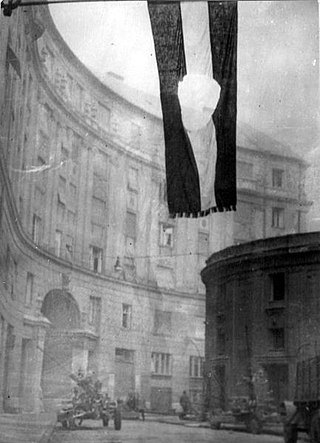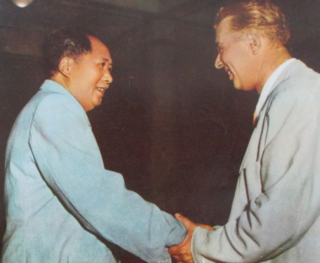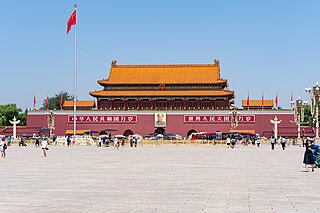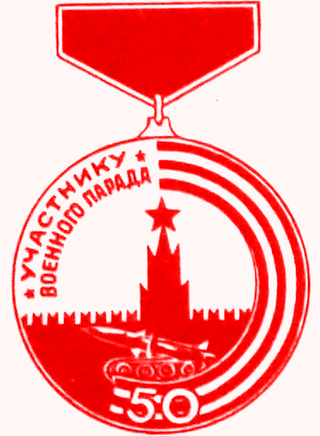Related Research Articles

In the USSR, during the eleven-year period from the death of Joseph Stalin (1953) to the political ouster of Nikita Khrushchev (1964), the national politics were dominated by the Cold War, including the U.S.–USSR struggle for the global spread of their respective socio-economic systems and ideology, and the defense of hegemonic spheres of influence. Since the mid-1950s, despite the Communist Party of the Soviet Union (CPSU) having disowned Stalinism, the political culture of Stalinism — a very powerful General Secretary of the CPSU—remained in place, albeit weakened.

The Hungarian Revolution of 1956, also known as the Hungarian Uprising, was an attempted countrywide revolution against the government of the Hungarian People's Republic (1949–1989) and the policies caused by the government's subordination to the Soviet Union (USSR). The uprising lasted 12 days before being crushed by Soviet tanks and troops on 4 November 1956. Thousands were killed and wounded and nearly a quarter of a million Hungarians fled the country.

The Sino-Soviet split was the gradual worsening of relations between the People's Republic of China (PRC) and the Union of Soviet Socialist Republics (USSR) during the Cold War. This was primarily caused by doctrinal divergences that arose from their different interpretations and practical applications of Marxism–Leninism, as influenced by their respective geopolitics during the Cold War of 1947–1991. In the late 1950s and early 1960s, Sino-Soviet debates about the interpretation of orthodox Marxism became specific disputes about the Soviet Union's policies of national de-Stalinization and international peaceful coexistence with the Western Bloc, which Chinese leader Mao Zedong decried as revisionism. Against that ideological background, China took a belligerent stance towards the Western world, and publicly rejected the Soviet Union's policy of peaceful coexistence between the Western Bloc and Eastern Bloc. In addition, Beijing resented the Soviet Union's growing ties with India due to factors such as the Sino-Indian border dispute, and Moscow feared that Mao was too nonchalant about the horrors of nuclear warfare.

Rodion Yakovlevich Malinovsky was a Soviet military commander and Marshal of the Soviet Union. He served as Minister of Defence of the Soviet Union from 1957 to 1967, during which he oversaw the strengthening of the Soviet Army and helped build up the image of the Soviet Union as a military superpower.

The Sino-Albanian split was the gradual worsening of relations between the People's Socialist Republic of Albania and the People's Republic of China in the period 1972–1978.

The Chairman Mao Memorial Hall, also known as the Mausoleum of Mao Zedong, is the final resting place of Mao Zedong, Chairman of the Politburo of the Chinese Communist Party from 1943 and the Chairman of the Chinese Communist Party from 1945 until his death in 1976.

Tiananmen Square or Tian'anmen Square is a city square in the city center of Beijing, China, named after the eponymous Tiananmen located to its north, which separates it from the Forbidden City. The square contains the Monument to the People's Heroes, the Great Hall of the People, the National Museum of China, and the Mausoleum of Mao Zedong. Mao Zedong proclaimed the founding of the People's Republic of China in the square on October 1, 1949; the anniversary of this event is still observed there. The size of Tiananmen Square is 765 x 282 meters. It has great cultural significance as it was the site of several important events in Chinese history.

Albania and China established diplomatic relations on November 23, 1949. Albania has an embassy in Beijing and China has an embassy in Tirana.

The 1965 Moscow Victory Day Parade was held on 9 May 1965 to commemorate the 20th anniversary of the capitulation of Nazi Germany in 1945. The parade marks the Soviet Union's victory in the Great Patriotic War.

Anti-revisionism (Marxism-Leninism) is a position within Marxism–Leninism which emerged in the mid-1950s in opposition to the reforms of Soviet leader Nikita Khrushchev. When Khrushchev pursued an interpretation that differed from his predecessor, Joseph Stalin, anti-revisionists within the international communist movement remained dedicated to Stalin's ideological legacy and criticized the Soviet Union under Khrushchev and his successors as state capitalist and social imperialist. During the Sino-Soviet split, the Communist Party of China, led by Mao Zedong; the Party of Labour of Albania, led by Enver Hoxha; and some other communist parties and organizations around the world denounced the Khrushchev line as revisionist.
Shi Zhe was a Chinese Communist military officer, diplomat, translator and interpreter. Trained by the Soviet OGPU, he notably served as the main Russian language interpreter for Mao Zedong on many occasions, most prominently for Mao's meetings with Joseph Stalin during the Chinese leader's visit to the Soviet Union in 1949.
The 1975 October Revolution Parade was a parade on Red Square dedicated to the 58th anniversary of the October Revolution on November 7, 1975. Marshal of the Soviet Union Andrei Grechko gave his last speech on the grandstand of Lenin's Mausoleum, before he died the following April. Commanding the parade was the head of the Moscow Military District Colonel General Vladimir Govorov. Providing the music for his final parade, was conducted by Major General Nikolai Nazarov of the combined massed bands of the Moscow Garrison. A scaled down display of military technologies that excluded tanks was also present, which cut the parade down to 30 minutes as a result. General Secretary of the Communist Party of the Soviet Union Leonid Brezhnev and Soviet Prime Minister Alexei Kosygin were present at the parade.
The 1987 October Revolution Parade was a parade on Red Square to celebrate the 70th anniversary of the October Revolution of 1917. It took place in Moscow on November 7, 1987. Marshal of the Soviet Union and the Minister of Defence Dmitry Yazov inspected the parade. Commanding the parade was the commander of the Moscow Garrison Vladimir Arkhipov. Music was performed by the head of Moscow Garrison's central band, Major General Nikolai Mikhailov. General Secretary of the Communist Party of the Soviet Union Mikhail Gorbachev and other members of the Politburo were on the grandstand of Lenin's Mausoleum in Red Square.
The 1989 October Revolution Parade was a parade that took place in Red Square in Moscow on 7 November 1989 to commemorate the 72nd anniversary of the socialist revolution in the Russian Empire in 1917. Mikhail Gorbachev and the Soviet leadership watched the parade from Lenin's Mausoleum. General of the Army and Minister of Defence Dmitry Yazov made his third holiday address to the nation after he inspected seven sets of armed battalions and academies. Col. Gen. Nikolai Kalinin the head of the Moscow Military District was the 1989 parade commander.

The 1967 October Revolution Parade was the parade on Moscow's Red Square devoted to the 50th anniversary of the Great October Socialist Revolution on 7 November 1967. Commanding the parade was First Deputy Commander of the Moscow Military District, Colonel General Yevgeny Ivanovsky.

Joseph Stalin, second leader of the Soviet Union, died on 5 March 1953 at his Kuntsevo Dacha after suffering a stroke, at age 74. He was given a state funeral in Moscow on 9 March, with four days of national mourning declared. On the day of the funeral, of the hundreds of thousands of Soviet citizens visiting the capital to pay their respects, at least 109 were later acknowledged to have died in a human crush.
An International Meeting of Communist and Workers Parties was held in Moscow, Soviet Union, November 16–19, 1957. The meeting was attended by 64 political parties from all over the world. The meeting was the first of its kind, marking a new form of forum for the world communist movement following the disbanding of the Communist International (Comintern) and the Information Bureau of the Communist and Workers' Parties (Cominform). Four additional parties attended clandestinely out of fear of repercussions at home.

October Revolution Day was a public holiday in the Soviet Union and other Soviet-aligned states, officially observed on November 7 from 1927 to 1990, commemorating the 1917 October Revolution.

Wu Xiuquan was a Chinese Communist revolutionary, military officer, and diplomat. He studied in the Soviet Union, enlisted in the Chinese Red Army, and participated in the Long March. After the founding of the People's Republic of China, he served as Vice Minister of Foreign Affairs, China's first ambassador to Yugoslavia, and Vice Minister of the International Department of the Chinese Communist Party. After being imprisoned for eight years during the Cultural Revolution, Wu was appointed Deputy Chief of the People's Liberation Army General Staff Department in 1975 and later served as vice president of the special court that tried and convicted the Gang of Four and the Lin Biao clique of numerous crimes during the Cultural Revolution.
References
- ↑ Pathé, British. "Parade And Demonstration In Russia". www.britishpathe.com.
- ↑ "Сюжеты Военный парад 7 ноября 1957 года. (1957)". www.net-film.ru.
- ↑ "1957: Mao Zedong visits Moscow - China.org.cn". www.china.org.cn.
- ↑ Granville 1998, p. 505-506.
- ↑ "Парад с перебоями". www.kommersant.ru. May 16, 2011.
- ↑ "Знаменитые парады на Красной площади — Российская газета". rg.ru.
- ↑ "НЕУДАВШИЙСЯ ГОСУДАРСТВЕННЫЙ ПЕРЕВОРОТ". October 19, 2018.